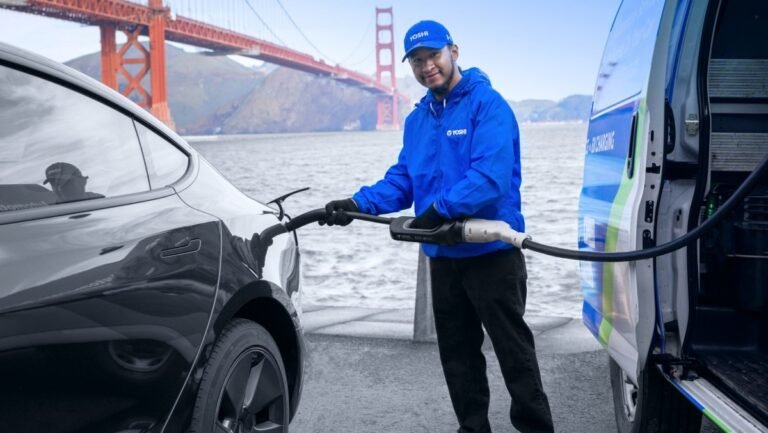
Yoshi Mobility has come a long way since gassing up cars on the side of the roadAlmost 10 years ago, Bryan Frist, Nick Alexander and Daniel Hunter had an idea to inject some technology into the automotive industry.
Using the initial entry point of gas, they started the Yoshi Mobility app to deliver gas to San Francisco-area consumers on their day of choice for $20 per month.
Expansion and new businessToday, Nashville-based Yoshi Mobility is settled into three business lines: preventative maintenance, virtual vehicle inspections and electric vehicle charging.
It has boots on the ground in 15 states, but can offer vehicle services to customers in all 50 states.
Yoshi Mobility has increased its revenue 10x monthly since its Series B in late 2020, Frist said.

India will lower import taxes on certain electric vehicles for companies committing to invest at least $500 million and setting up a local manufacturing facility within three years, a move that could potentially bolster Tesla’s plans to enter the South Asian market.
Firms meeting these requirements will be allowed to import 8,000 EVs a year at a reduced import duty of 15% on cars costing $35,000 and above.
India currently levies a tax of 70% to 100% on imported cars depending on their value.
The decision could pave the way for Tesla to enter India, as the Elon Musk-led company has been in talks with the government to lower import duties on its electric cars for years.
The move also aligns with India’s goal to boost the adoption of EVs and reduce its dependence on oil imports, with the country setting a target of achieving 30% electric vehicle sales by 2030.

In May 2019, Ultrahaptics and Leap Motion became Ultraleap (not to be confused with Magic Leap, which operates in the same space).
“I think it’s a long-term vision for XR,” Carter said of the deal.
Founded by a pair of University of Bristol students three years after Leap Motion, Ultrahaptics harnesses ultrasound waves to create tactile feedback.
Much like the earlier Leap Motion product, it would be possible to mount a device to the front of the visor, but directionality is important.
The Leap Motion tech determines your hands’ orientation in space, while haptics provide tactile feedback when you come into contact with the virtual object.

In this edition of WiR, we cover Carta’s allegedly unethical tactics, Samsung’s Ballie home robot, Volkswagen bringing ChatGPT into its cars and Amazon embracing more generative AI.
Saarinen alleged in a LinkedIn post that Carta misused sensitive information that startups entrust to the company in pursuit of its own goals.
Samsung’s Ballie returns: Remember Ballie, Samsung’s spherical home robot from CES 2020?
Volkswagen cars get ChatGPT: Volkswagen is getting into the ChatGPT game.
Enterprises skeptical of GenAI: Generative AI gets a lot of press, from image-generating tools like Midjourney to Runway to OpenAI’s ChatGPT.

Hertz is selling its EVs because it botched the rollout for ride-share drivers It's a precautionary tale for how to assess new markets — and how not to introduce a new product.
Hertz made a splash in 2021 when it announced that it would buy 100,000 Tesla Model 3 sedans in a little over a year.
Hertz said in an SEC filing that it would be selling 20,000 of its EVs and replacing them with fossil fuel-powered vehicles.
After Hertz started buying EVs, it directed most of them to Uber drivers.
Uber drivers also rented the cars for longer periods of time, Hertz said, meaning that fewer employees were needed to support a given number of vehicles.
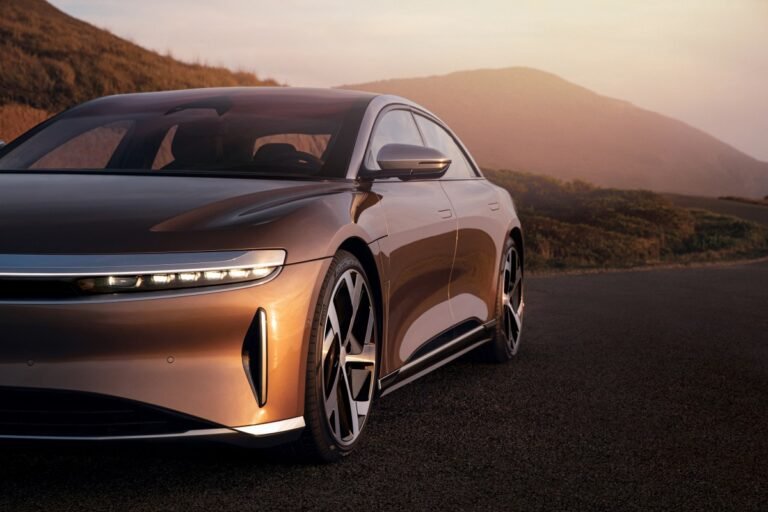
Lucid Motors delivered only 6,001 of the 8,428 cars it built last year, as it continues to struggle to generate demand for its luxury electric sedans.
Lucid also said in late 2023 that it had shipped 800 cars to Saudi Arabia to be assembled at a new facility in the Kingdom.
In total, Lucid’s 2023 production and sales figures were only marginally better than they were in 2022, where it built 7,180 cars and delivered 4,369 of them.
The disappointing sales figures cap a tough year for Lucid.
This story has been updated to note that Lucid Motors declined to comment on whether the 800 cars in Saudi Arabia were included in the delivery figures.
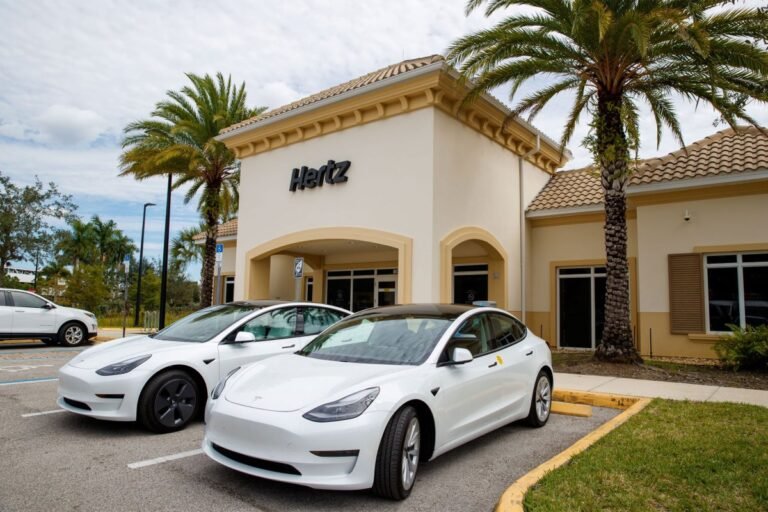
Hertz is selling off a third of its electric vehicle fleet, which is predominantly made up of Teslas, and will buy gas cars with some of the money it makes from the sales.
Hertz’s move to slash its EV fleet comes as electric vehicle sales growth has cooled from record highs.
Just two years ago, Hertz announced plans to buy 100,000 EVs from Tesla by the end of 2022.
Instead, as of October 2023, Hertz had only purchased 35,000 Teslas and its entire electric fleet included about 50,000 EVs total.
It announced plans in 2022 to buy up to 175,000 EVs from General Motors, and another 65,000 from Polestar.
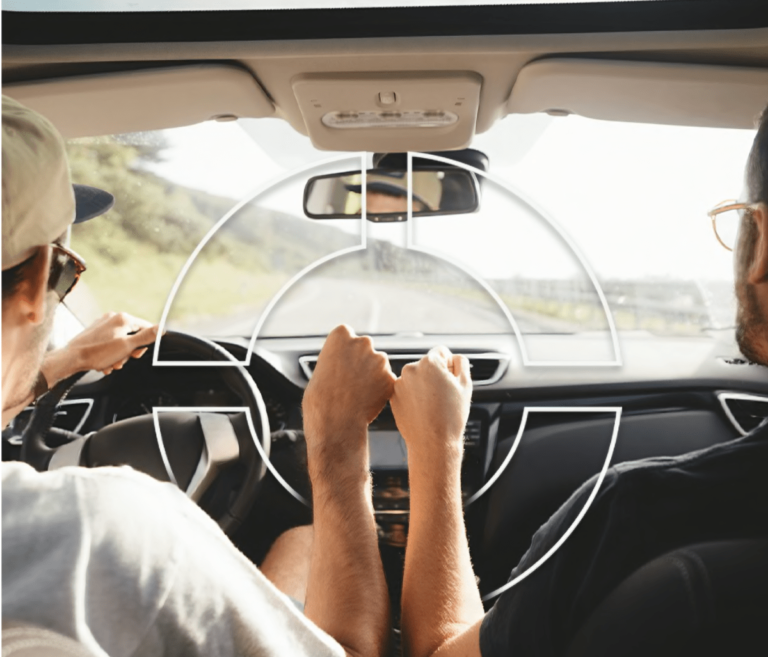
That emphasis on sustainability is translating into a goal at Finn to have 80% of its car inventory electric by 2028, from 40% today.
Previous backers such as HV Capital, Korelya Capital, UVC Partners, White Star Capital and Picus Capital are also participating.
It’s been a very bumpy road for the car subscription market over the years.
The idea of car subscriptions is neat, but the execution is not.
And it’s brokered deals in advance with car retailers to buy up the vehicles when subscriptions are finished.
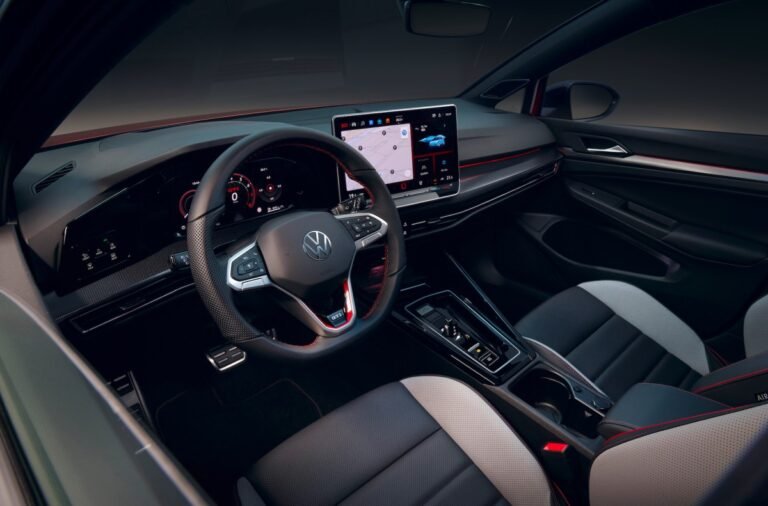
The German automaker announced Monday at CES 2024 in Las Vegas plans to add an AI-powered chatbot into all Volkswagen models equipped with its IDA voice assistant.
The AI-based chatbot, which is based on software company Cerence’s Chat Pro product, will roll out in the second quarter, starting with Europe.
For now, Volkswagen models in the United States won’t have the feature.
The voice assistant is activated with the “Hello IDA” wake word or by pressing the button on the steering wheel.
The response will come through the IDA voice assistant so drivers may not even know when ChatGPT is and is not in use.

The in-car tech used by the likes of Ford and GM to make sure drivers pay attention to the road has come a long way.
NHTSA says it evaluated 331 driver monitoring systems and found none that are commercially available that can properly handle identifying alcohol impairment.
Driver monitoring isn’t the only option NHTSA has at its disposal, though.
Accuracy is key, and according to NHTSA’s findings, blood alcohol detection tech is a more viable near-term answer.
But this tech is considered “active,” meaning the driver has to proactively engage with the tech — which flies in the face of the law’s passive requirement.













